Parables, Hidden Treasure, and Rejection
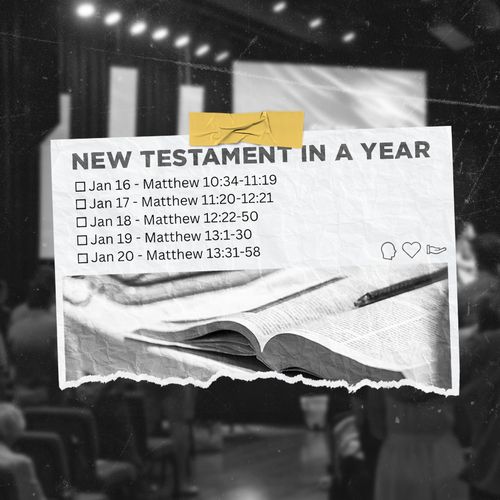
“He put another parable before them, saying, “The kingdom of heaven is like a grain of mustard seed that a man took and sowed in his field. It is the smallest of all seeds, but when it has grown it is larger than all the garden plants and becomes a tree, so that the birds of the air come and make nests in its branches.” He told them another parable. “The kingdom of heaven is like leaven that a woman took and hid in three measures of flour, till it was all leavened.” All these things Jesus said to the crowds in parables; indeed, he said nothing to them without a parable. This was to fulfill what was spoken by the prophet: “I will open my mouth in parables; I will utter what has been hidden since the foundation of the world.” Then he left the crowds and went into the house. And his disciples came to him, saying, “Explain to us the parable of the weeds of the field.” He answered, “The one who sows the good seed is the Son of Man. The field is the world, and the good seed is the sons of the kingdom. The weeds are the sons of the evil one, and the enemy who sowed them is the devil. The harvest is the end of the age, and the reapers are angels. Just as the weeds are gathered and burned with fire, so will it be at the end of the age. The Son of Man will send his angels, and they will gather out of his kingdom all causes of sin and all law-breakers, and throw them into the fiery furnace. In that place there will be weeping and gnashing of teeth. Then the righteous will shine like the sun in the kingdom of their Father. He who has ears, let him hear. “The kingdom of heaven is like treasure hidden in a field, which a man found and covered up. Then in his joy he goes and sells all that he has and buys that field. “Again, the kingdom of heaven is like a merchant in search of fine pearls, who, on finding one pearl of great value, went and sold all that he had and bought it. “Again, the kingdom of heaven is like a net that was thrown into the sea and gathered fish of every kind. When it was full, men drew it ashore and sat down and sorted the good into containers but threw away the bad. So it will be at the end of the age. The angels will come out and separate the evil from the righteous and throw them into the fiery furnace. In that place there will be weeping and gnashing of teeth. “Have you understood all these things?” They said to him, “Yes.” And he said to them, “Therefore every scribe who has been trained for the kingdom of heaven is like a master of a house, who brings out of his treasure what is new and what is old.” And when Jesus had finished these parables, he went away from there, and coming to his hometown he taught them in their synagogue, so that they were astonished, and said, “Where did this man get this wisdom and these mighty works? Is not this the carpenter’s son? Is not his mother called Mary? And are not his brothers James and Joseph and Simon and Judas? And are not all his sisters with us? Where then did this man get all these things?” And they took offense at him. But Jesus said to them, “A prophet is not without honor except in his hometown and in his own household.” And he did not do many mighty works there, because of their unbelief.” (Matthew 13:31–58, ESV)
Seeds And Leaven
In the third parable, Jesus likens the kingdom to a mustard seed. Here, we see a man scattering seed, indicating a connection to the two preceding parables, but with some variations. The mustard seed, the smallest of all cultivated seeds in Israel, usually grows into a sizable bush, six to twelve feet tall. But this mustard plant grows so large that it functions as a tree, with birds coming to build nests in its branches. The message is clear: Jesus and his disciples may have seemed insignificant in their own eyes and in the eyes of the Jewish and Roman leaders, but the kingdom of God will grow steadily from the small seed they planted. In time, it will become far greater than anyone expected.
Jesus presents a woman kneading dough, adding a small amount of leaven to a large bowl of flour. Jews often considered yeast to be unclean, so this could be confusing. But symbols in the Bible are flexible and yeast isn't always negative. The point is clear: a tiny amount of leaven can make a huge difference in a large batch of dough. The kingdom is like this too: a small portion has transformative power.
Jesus presents a woman kneading dough, adding a small amount of leaven to a large bowl of flour. Jews often considered yeast to be unclean, so this could be confusing. But symbols in the Bible are flexible and yeast isn't always negative. The point is clear: a tiny amount of leaven can make a huge difference in a large batch of dough. The kingdom is like this too: a small portion has transformative power.
Prophecy And Parables
Jesus taught these things to the crowds in parables, which he said fulfilled a prophecy in Psalm 78:2: “I will open my mouth in parables, I will utter things hidden since the creation of the world.” Psalm 78 reviews Israel's history, highlighting two themes: God is the Rock and Redeemer of Israel, but Israel has been rebellious—at best, sporadically faithful. Despite this, God never abandoned Israel, and prepared a Redeemer for her (78:67–72). The next two parables affirm this point and add one more thought: the kingdom not only grows large, but is of supreme value.
Treasure
The ancients had no way to secure their valuables, so when they had to flee due to brigands or war, they buried their treasures in clay jars. The behavior of the laborer who finds the treasure and buries it again may seem confusing to us, but was in line with the customs of the time. According to the laws of the day, anyone who found something in a field was entitled to keep it, and if the treasure had great value, it was best to keep it hidden and purchase the field. Jesus is making the point that the kingdom is so valuable that we should be willing to give up all we have to obtain it.
In the next parable, a man discovers something of great worth and gives up all he has to acquire it. This parable reaffirms the supreme value of the kingdom, yet it adds an interesting twist. Unlike the first parable, where a worker stumbles upon his treasure, this parable features a merchant who actively searches for pearls (13:45). Even with his expertise, he decides that this one pearl is worth more than all his possessions. In his eagerness to obtain it, he gives up all he has.
In the next parable, a man discovers something of great worth and gives up all he has to acquire it. This parable reaffirms the supreme value of the kingdom, yet it adds an interesting twist. Unlike the first parable, where a worker stumbles upon his treasure, this parable features a merchant who actively searches for pearls (13:45). Even with his expertise, he decides that this one pearl is worth more than all his possessions. In his eagerness to obtain it, he gives up all he has.
Sorted
In the parable of the fishing net, Jesus compares the work of fishermen to the ultimate judgment of the righteous and the wicked. The fishermen would divide the edible fish from those that would have to be discarded. This is similar to the parable of the weeds, in which Jesus explains that the angels will separate the wicked from the righteous on the day of judgment. Those who are outside the kingdom of heaven will face a harsh punishment. Placing this parable in the context of the others, we understand that if we do not value the King and his kingdom, we will be discarded on the last day.
Get It?
Jesus inquires if his followers have grasped the teachings about the kingdom, and they affirm that they have. Having been taught by Jesus, they are now prepared to pass on these teachings to others. They will share the “old and new” (13:52). The old are the well-known truths of Scripture. The new are the truths Jesus has just taught them. The kingdom grows slowly, but it is God's blessing and our greatest treasure. Jesus’ closing statement definitely encourages us to listen to, trust, and cherish the gospel of the kingdom.
Home Is Where The Skeptics Are
Sadly, not everyone responded positively to Jesus’ teachings in his day, as we see in the scene that follows. Matthew tells us that when Jesus had finished teaching, he went to his hometown and began teaching in the synagogue. Those present were amazed by his wisdom and his miraculous powers, but their response was not necessarily one of faith. They openly questioned his identity and background, asking, “Isn’t this the carpenter’s son? Aren’t his mother’s name Mary, and aren’t his brothers James, Joseph, Simon and Judas? Aren’t all his sisters with us?” (13:55–56). In other words, they were skeptical of his claim to be a teacher, healer, and a man of God, given that he was not from a leading family. This led them to take offense at him (13:57).
Jesus responded to their doubt in two ways. First, he cautioned them not to let their knowledge of his family obscure his true identity. He declared, “A prophet is without honor in his own town and in his own home.” Second, he allowed them to experience the consequences of their skepticism: “And he did not work many miracles there due to their lack of faith” (13:58). Jesus was certainly able to perform a miracle if nobody believed in him, and he did perform miracles for unbelievers on occasion—for example when he fed five thousand people at once. But he refused to perform miracles just to impress skeptics (cf. Luke 23:6–12), so he did very little in his hometown. He simply healed a few who were ill (Mark 6:5).
Jesus responded to their doubt in two ways. First, he cautioned them not to let their knowledge of his family obscure his true identity. He declared, “A prophet is without honor in his own town and in his own home.” Second, he allowed them to experience the consequences of their skepticism: “And he did not work many miracles there due to their lack of faith” (13:58). Jesus was certainly able to perform a miracle if nobody believed in him, and he did perform miracles for unbelievers on occasion—for example when he fed five thousand people at once. But he refused to perform miracles just to impress skeptics (cf. Luke 23:6–12), so he did very little in his hometown. He simply healed a few who were ill (Mark 6:5).
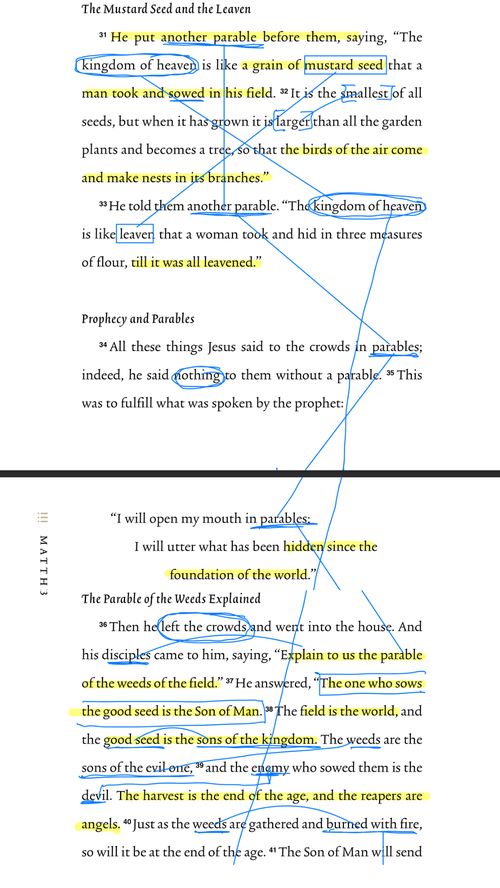
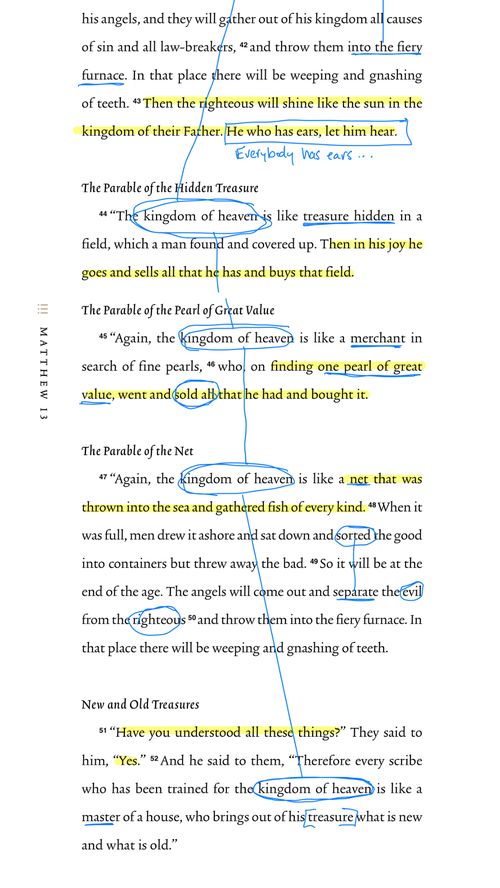
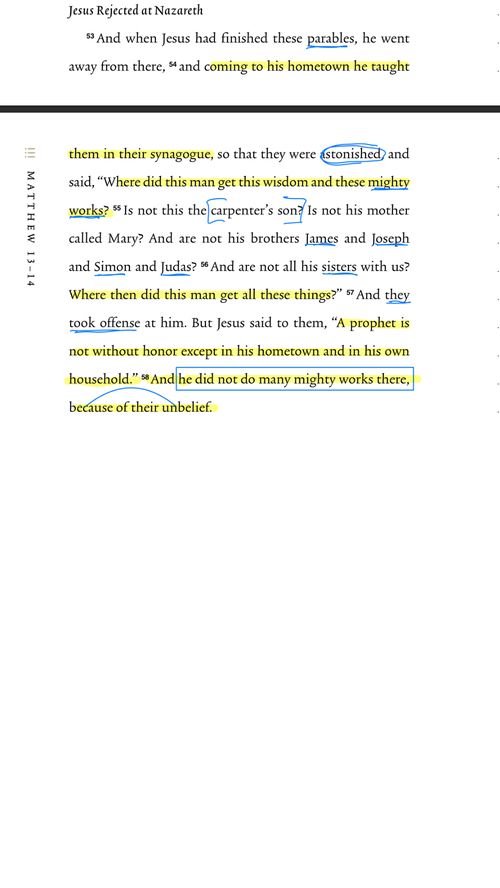

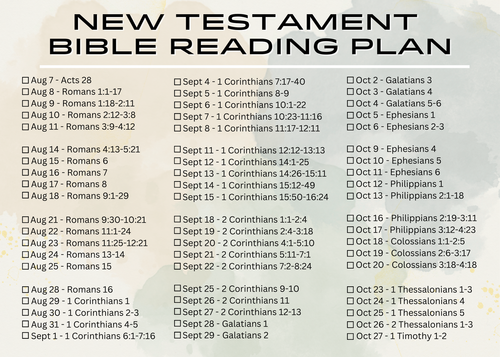

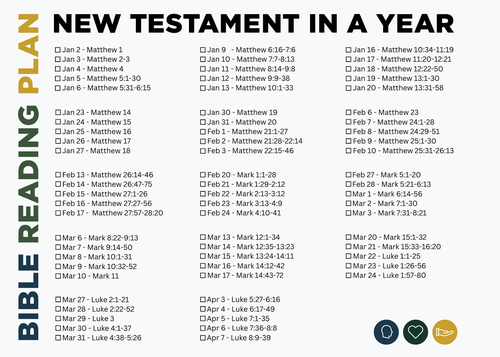
Recent
Archive
2023
January
Happy New Year!He Will Save His People From Their SinsMy Beloved SonTemptation And MinistryThe SermonLeaving, Lying, Limits, Love, Largesse, and The Lord's PrayerTreasure, Anxiety, and JudgmentAstonishing AuthorityStorms, Demons, and HealingJesus Is CompassionateHis Eye Is On The SparrowSwords, Rewards, and MessengersThe Lord of the SabbathBlasphemy, Bad Trees, Signs, and FamilyStories, Sowers, and SoilsParables, Hidden Treasure, and RejectionFame, Food, Fear, Faith, and FringeReal Issues And The Power Of GodDying To Find LifeLike The SunChildren, Temptation, Sheep, And ForgivenessMarriage, Kids, And MoneyTo Serve And Give His Life
February
The ArrivalStories That StingQuestion TrapsHidden Motives And LamentThe End...?UnexpectedReady?Punishment, The Plot, And PerfumeTreachery, Passover, and The CupBetrayal, Injustice, And DenialThe Field Of Blood And The GovernorCrucifixion And DeathAll AuthorityMark—The Beginning Of The GospelHealing, Preaching, And The Forgiveness Of SinEating With Tax Collectors, Fasting, The Sabbath, And An Escape BoatThe Twelve, Blasphemy, Family, And A ParableParables And PowerA Different Kind Of StormPower Had Gone Out
March
Death, Hunger, And MiraclesCommandment Or TraditionDo You Not Yet Understand?The Christ And A Glimpse Of His GloryUnbelief, Confusion, And SinDivorce, Children, And PossessionsTo Give His Life As A RansomHosannaThe Rejected Stone, Taxes, And The Great CommandmentDestruction And The EndNo One Knows, An Anointing, And A Promise To BetrayPassover And GethsemaneThe Kiss, Arrest, And DenialPilate, Simon, And The CrucifixionDeath, Burial, Resurrection, And What\'s NextTheophilus And A Visit From GabrielMary And The MagnificatBenedictusThe Arrival And The ShepherdsSimeon, Anna, And The SpiritFruits Keeping With Repentance And BaptismThe Wilderness, Nazareth, And CapernaumSimon's Mother-In-Law, Fishing, A Leper, And Sins
April
Tax Collectors, Fasting, Sabbath Controversies, And The TwelveWhy Do You Call Me Lord, Lord?Jesus Marveled, A Raised Son, And QuestionsA Sinful Woman And A ParableObeying The Word, A Storm, And DemonsTwelve Years, Twelve Apostles, And SpeculationGreater, Costly, And GloryNot Getting It, The Cost, And AppointedWoes, Neighbors, And What Is NecessaryHelp Us Pray And A Divided Kingdom?Signs, Lights, And WoesHypocrisy, Fear, A Fool, And AnxietyParables, Division, And The TimesWarnings, A Daughter Of Abraham, And Jerusalem, JerusalemA Son Or An Ox, Parties, And DiscipleshipLost ThingsThe Dishonest Manager, The Law, And Anguish In This FlameMillstones And Mustard SeedsPersistent Prayer, Humility, A Childlike Faith, And The Rich RulerEverything That Is Written, A Blind Beggar, And A Wee Little Man
May
A Parable, A Colt, A Prophecy, And A CleansingAuthority, Wicked Tenants, And TaxesThings To Beware Of And WidowsDestruction, Persecution, The Son Of Man, And WatchingThe Plot, Betrayal, Lord's Supper, And Inappropriate BehaviorPrediction, Fulfillment, Agony, Betrayal, And DenialMistreated, Taken Before The Council, Pilate, Herod, And Delivered To Be CrucifiedCrucifixion, Death, And BurialHe Is Not HereDisbelieved For JoyIn The Beginning…The Lamb Of God And A WeddingZeal, What's Inside, And Born AgainHe Must Increase
Categories
no categories
Tags
no tags
